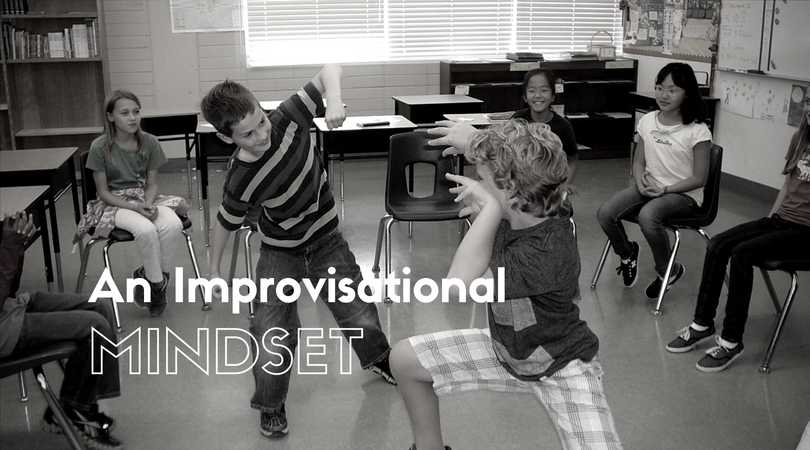This post is by our founder and executive director, Naomi Kinsman. She has been sharing about the Society of Young Inklings teaching method called Writerly Play. To read more about it, see this previous post.
Writerly Play started as an experiment.
In theatre class, my students were using improv games to develop a collaborative script. They each wanted the story to go a different way. As their director, I needed them to find a compromise. However, as a writer, I saw their point. The games lit up their imaginations, connected with their hearts, and created ideas for plot lines that spiderwebbed out in hundreds of directions.
I decided to try using the improvisational games in a writing class. Success! Weeks one and two were an overwhelming success. However, by week three and four, each writer had started his or her story, and we needed to move beyond idea generation. What, I wondered, might the role of improvisation be in a writer’s process?
In theatre, improvisational games are often used to explore possibilities. Actors work on skills such as the ability to say yes to ideas, to physicalize characters in believable ways, and to deliver dialogue with excellent timing and clarity. My writers didn’t need to perform their stories for an audience. It didn’t make sense to take the improvisational games in the direction I’d been trained to take them: toward stronger performance skills. We needed to use the games to capture and develop ideas on the page.
Through experimentation, my students and I learned many things about how improvisation can inform and facilitate the writing process. We’ll explore more of what we discovered in coming weeks. Today, I want to focus on one of our first discoveries, which had to do with the questions, “What if…?” and “How might I…?“
One of the fundamental differences between a writer who stares at a blank page and a writer who simply starts writing is the ability to ask oneself, “What if…?” or “How might I…?”
The first writer waits for an idea to show up. She’s expecting the idea to look something like the beginning of a story, something along the lines of “Once upon a time, a frog…” Or, she may be searching her mind for a possible character, such as a giant or a dragon or a chef. If we could peek inside her mind, we’d see that the writer is concentrating deeply, rummaging around in her imagination for shreds of ideas, hoping to catch hold of something promising. If she does land on an idea, the first thing she does is launch an interrogation. What are the details of this possibility? Will it be interesting and exciting? Will she be able to write a whole story about it? Are there any weaknesses? If the idea doesn’t live up to her expectations, it’s tossed out, and she’s back to searching for the perfect idea.
No wonder she struggles to write anything down on her blank page.
Now, the second writer doesn’t start by waiting or rummaging. Instead, he asks himself, “What if…?” or “How might I…?” and fills in one of those two blanks with a question. “What if a dragon showed up on the school bus?” or “How might I start a story about a girl and her dog?”
The second writer doesn’t worry about whether this story will work out in the end. He might write for a few minutes, exploring the question he’s posed and decide he wants to start again. His questions are still there waiting for him. This is an important distinction, because with his questions, he can try again. “What if a mouse carved a boat out of cheese?” or “How else might I start a story about a girl and her dog?”
One of the most important skills improvisation teaches is the ability to ask productive questions without worrying about where the answers will lead. An improvisational scene need only take a minute or two to play out. After it is done, the actors can try another one. Improvisation is quick and requires very little commitment. When writers feel as though every idea they choose will take weeks to complete, of course they will labor over finding the perfect option. If, instead, a writer approaches his or her work with an improvisational mindset, writing becomes a series of fast-paced experiments. When an idea runs into a dead end, the writer can determine what didn’t work and start again with new information. The idea develops over time with each iteration.
Both writers may take a while to commit to a story. However, the writer with the improvisational mindset has much more to show for his thinking process. He has snippets of ideas that he can now weave into his work, while the writer who sought the perfect idea is still staring at her blank page.
The ability to ask these powerful questions, and to explore a story with an improvisational mindset is key to overcoming obstacles and blocks along the way. The creative process is always bumpy and a writer’s chances of getting stuck at some point are nearly 100%. That’s why Writerly Play focuses on helping writers learn to ask questions and to explore options. Over time, we’ve learned that in addition to traditional theatre games, there are many other improvisational games that tap into other kinds of play. Drawing, collage, question games, and many other activities develop mental flexibility and the ability to ask questions and play with possibilities.
What are your favorite games that stretch your ability to explore options? Feel free to share your ideas in the comment section below. Or, connect with us on Facebook or Twitter. We always love hearing from you.
To read more thoughts on how improv can play a role in your creative life, read this.


